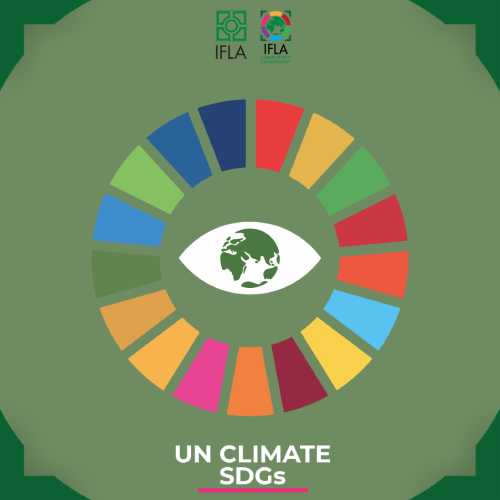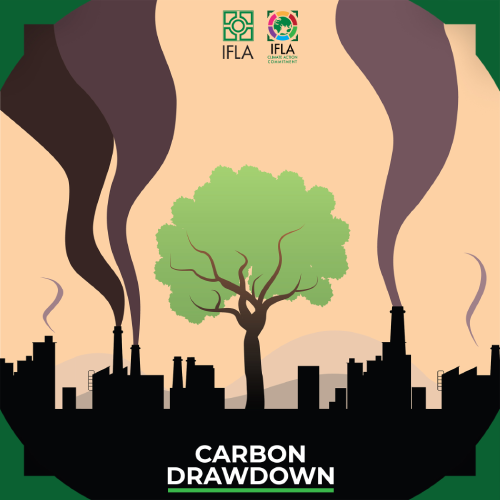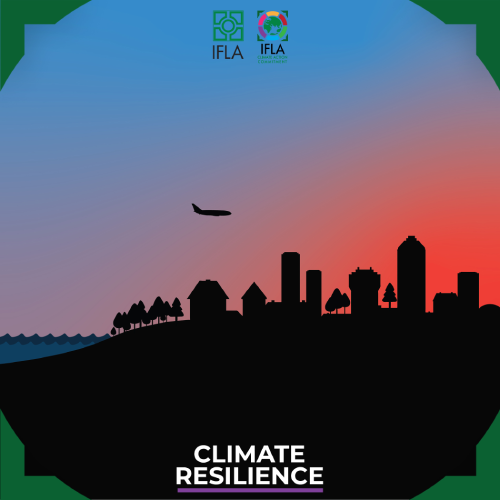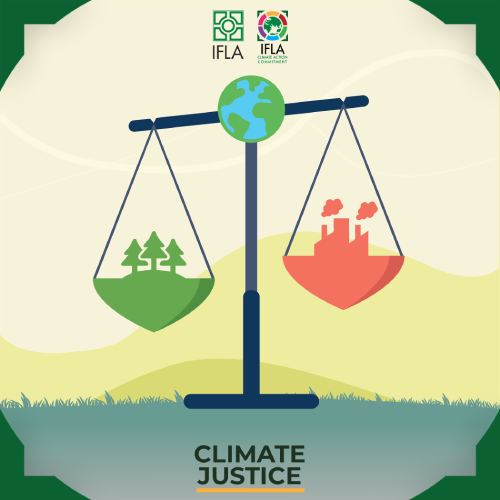COP26 – Climate Action Commitment
Claire Martin - Chair, Climate Change Working Group, International Federation of Landscape Architects (Asia-Pacific Region) - Fellow, President, Australian Institute of Landscape Architecture
According to a new report from the Intergovernmental Panel on Climate Change (IPCC), unless there are immediate, rapid, and large-scale reductions in greenhouse gas emissions, limiting warming to 1.5oC -- or even 2oC -- will be beyond reach. The Built Environment and Construction Sector accounts for 38% of global Carbon Emissions.
In the lead of the UN Climate Change Conference UK 2021 (COP26) the International Federation of Landscape Architects (IFLA) Asia-Pacific and World Climate Change Working Group and the Professional Practice and Policy Committee, have helped to develop the IFLA Climate Action Commitment to help secure global net zero by mid-century and keep 1.5 degrees within reach and to adapt to protect communities and habitats.
Leading built environment industry groups from around the world, including IFLA, are committing to the Paris Agreement’s 1.5oC target, and are challenging governments to do the same through the 1.5oC COP26 Communiqué. The IFLA Climate Action Commitment is a collaborative commitment by international membership organisations to promote the sector’s critical role in addressing the climate and ecological emergencies.
The commitment has been ratified by several national associations in the Asia-Pacific region including (at the time of writing) the Australian Institute of Landscape Architects (AILA), Chinese Society of Landscape Architecture (CHSLA), Indian Society of Landscape Architects (ISOLA), Japan Landscape Architecture Union (JLAU), Sri Lanka Institute of Landscape Architects (SLILA), Tuia Pito Ora / New Zealand Institute of Landscape Architects (NZILA),
The IFLA Climate Action Commitment is reproduced below.

The climate crisis is escalating
The 2021 report of the Intergovernmental Panel on Climate Change (IPCC) described the looming crisis in global warming, and the resultant impacts it will have on environments and communities throughout our world. IFLA believes that the key to solving the climate crisis is vested in the reduction of emissions, in the resilience and transformation of human society and in the sustainability of the natural environment.
Landscape architects deliver climate solutions at scales that matter
Landscape architects are uniquely qualified to help prevent catastrophic global environmental and societal breakdown. Through planning, design and management, our work protects and repairs global ecosystems; fosters human health, wellbeing and happiness; cools the environment and draws down atmospheric carbon.
Landscapes include complex, interactive systems that provide a wide range of goods and services. With 70 percent of global populations projected to be living in cities by 2050, holistic landscape interventions are critical to transformation and sustainability.
As a creative discipline we bring expertise on nature-based solutions, technological innovation, and strategic thinking that delivers for nature and people. We accelerate city afforestation to sequester carbon, generate urban biodiversity and protect cities from extreme heat – a growing threat to human survival. Beyond urban environments, we work at all scales: global, regional, local, and human, to strengthen, protect and enhance the wider functionality of ecosystems. We amplify biodiversity and societal prosperity, fostering resilient communities better prepared for a changing climate. Landscape architects connect people to nature and to each other to fulfil our deepest human needs.
IFLA is issuing a Call to Action
Society needs new approaches to decision-making, progressive policies, and a universal commitment to innovative ideas. In support of sovereign governments accelerating their Nationally Determined Contributions we call on our peers and allied professions to help strengthen our actions through interdisciplinary collaboration. With sustained private and public sector investment in transformative landscape projects, we can achieve the scale of renewal and restoration required.
Over 70,000 landscape architects around the world are taking action as global citizens to limit planetary warming to 1.5 degrees Celsius.
As a global profession, we commit to:

Advancing the United Nations Sustainable Development Goals
Through each of the 77 nations represented by the IFLA, landscape architects within our member associations accelerate our work to repair global ecosystems.

Attaining global net zero carbon emissions by 2040
We will dramatically reduce operational and embodied carbon emissions produced by our work, harness the unique capacity of landscapes to draw down carbon dioxide, and advocate for clean and multi-modal transport systems.

Enhancing the capacity and resilience of liveable cities and communities
By implementing green infrastructure approaches, landscape architects will work to mitigate urban heat island effects, and reduce the risks associated with fire, drought, and flood.

Advancing social wellbeing
Landscape architects will increase support for equity and equality, food security and the right to clean water and happiness for all.

Learning from cultural knowledge systems
We commit to respecting and working with indigenous cultural land management knowledge to mitigate climate change impacts and continue work towards reconciliation.

Galvanizing climate leadership
Landscape architects are uniquely placed to galvanize and lead a built environment response to this crisis. We will continue to collaborate with clients, suppliers, and allied professions to champion climate-positive design.
If you want to join these associations in ratifying the IFLA Climate Action Commitment, please contact admin@iflaworld.org.

